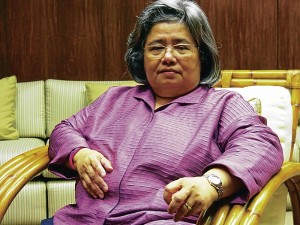RM awardee taps universities to set up herbal centers
Known for creating the first-generic version of a “cocktail” pill for patients suffering from the human immunodeficiency virus (HIV), Thai pharmaceutical chemist Krisana Kraisintu, a 2009 Ramon Magsaysay awardee, was in the Philippines recently to promote traditional oriental medicine.
Kraisintu, a pharmacist-scientist who serves as the current dean of the Faculty of Pharmacy and honorary dean of the Faculty of Oriental Medicines in Thailand’s Rangsit University (RSU), signed a memorandum of understanding between the University of the Philippines-Manila and RSU for academic exchanges and collaborative efforts in promoting and developing herbal medicines.
Kraisintu also met with the faculty of the Adamson University College of Nursing for a possible RSU-AdU technology exchange and internship program in oriental medicine.
Kraisintu received the Ramon Magsaysay Award in 2009 for her work in developing an affordable generic antiretroviral drug to treat HIV, the virus that causes AIDS (acquired immune deficiency syndrome). Since then, her generic drug has been able to treat more than 150,000 poor patients annually in Thailand, Cambodia, Laos and Vietnam. She has also conducted a number of humanitarian missions, which has led her to develop a generic antimalarial drug and to bring anti-AIDS antiretroviral drugs (ARVs) to Africa.
Livelihood, health opportunities
Kraisintu revealed to Inquirer Health & Science she wanted to help set up manufacturing facilities in academic institutions that would specialize in scientifically formulating herbal medical products. Kraisintu said she wanted to follow the same principle she had been doing in her home country: source raw materials from neglected rural areas, thereby helping communities increase livelihood and health opportunities. Kraisintu has since set up two herbal manufacturing facilities: one in southern Thailand (Prince of Songkla University, Hadyai District, Songkla Province) and the other in RSU.
“We try to reach those people in this way, using materials from neglected southern provinces. This way, I can get to the heart of the people,” she explained.
She added: “After manufacturing the products, I send these to them so they would be very proud that they are part of the product. This is very important psychologically. You’re proud that your raw material is in the product. And the plan that I set up in the south involves all halal products.
Not lost to oblivion
Kraisintu said it was fortunate that the knowledge and practice of traditional medicines wasn’t lost to oblivion. “Ayurveda is 5,000 years old, and Chinese medicine is 2,500 years old. It’s old wisdom, and the Thais blend these two to have our own traditional knowledge.”
During her stay in the Philippines, Kraisintu also visited Living Well, a clinic run by former health secretary Dr. Jaime Galvez-Tan, who, like Dr. Kraisintu, has been promoting traditional healthcare such as hilot (therapeutic massage), acupuncture, acupressure and herbal medicines through grassroots organizations.
“The tie-up between Rangsit University and UP Manila is long awaited. The Philippines can learn so much on how Thailand has made so much progress in integrative medicine combining Thai and Chinese and Ayurveda and North American/European medicine,” Galvez-Tan told the Inquirer.
Imelda G. Peña, RPh, DrPh, dean of the UP Manila’s College of Pharmacy, explained to Inquirer that the MOU between Rangsit University and UP Manila is still general in form, and that the two institutions would “explore specifics in the next few weeks.”
“Setting up of a pilot manufacturing plant for herbal plants in UP Manila is just one of the future plans. We will be sending first some research faculty for training at Rangsit University within the first half of the year,” Peña disclosed.
Not against western meds
Kraisintu has been known for ruffling the feathers of multinational pharmaceutical companies and governments, and even rousing controversy with international laws.
“Oriental medicine is not against Western medicine. To save one’s life, you can use all means, either traditional or modern,” she told Inquirer.
She also credited part of her knowledge in oriental medicine to her grandfather, who practiced traditional healing modes. She is a daughter of a medical doctor and a nurse.
Kraisintu earned a doctorate in pharmaceutical chemistry from Bath University in England. In 1983 she joined the Government Pharmaceutical Organization (GPO) and led the then newly created Research and Development Institute, guiding the production of numerous generics for a wide range of illnesses, including hypertension and diabetes.
When AIDS became a national epidemic in Thailand, she conducted research on ARVs despite widespread skepticism, lack of government support and lawsuits from drug companies. In 1995, after months of solitary toil with toxic materials in a windowless lab, Krisana successfully formulated the generic version of AZT (zidovudine), which generally treats HIV and reduces the risk of mother-to-child transmission. Introduced into the market at only one-fourth the cost of the branded product, it is the developing world’s first generic ARV drug.
